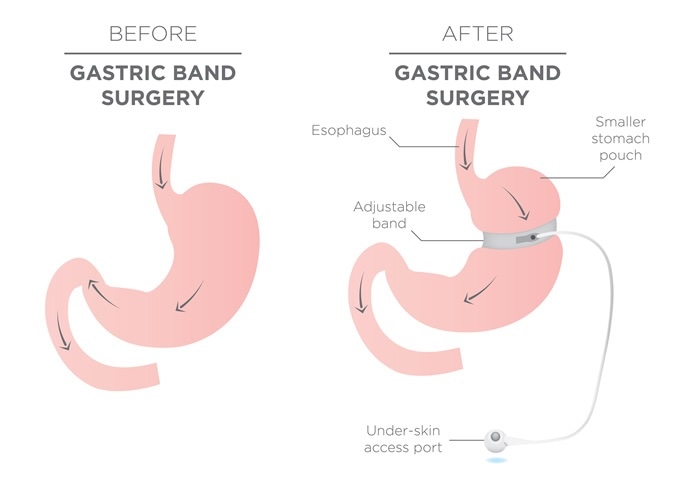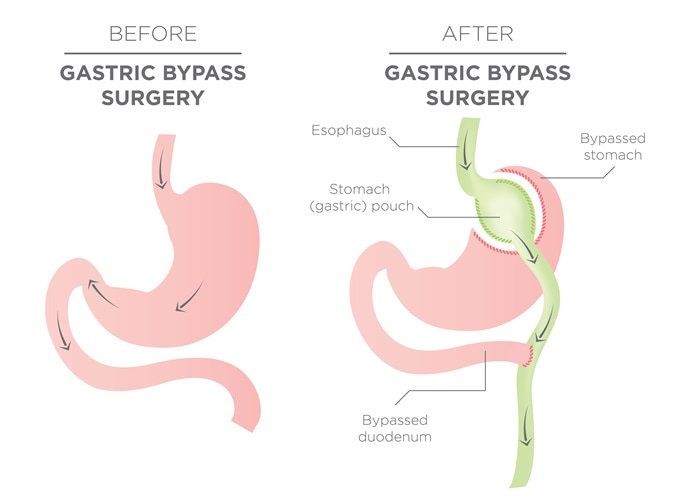Also called weight loss surgery, bariatric surgery is an operation performed to reduce the size of the stomach and help people to lose weight if they have become severely or morbidly obese.
Bariatric surgery has proved an effective tool for helping such individuals to reduce their food intake, lose weight and improve or cure conditions they have as a result of obesity.
The main bariatric surgeries are gastric bypass, a gastric band procedure and sleeve gastrectomy, all of which reduce the amount of food the stomach can hold and decrease the amount a person needs to eat in order to feel full.
In order to successfully lose weight after one of these procedures, it is crucial that patients adhere to the dietary recommendations made by their healthcare provider.
Diet Following Gastric Band Procedure
Immediately after this operation and for the next four weeks, patients are only able to consume liquids and small amounts of pureed foods. Soft foods can usually be consumed between four to six weeks after the procedure. After six weeks, people can gradually start to follow a healthy, long-term diet that includes small, nutritious amounts of food. People should adhere to this diet plan for the rest of their lives. Although weight loss is the aim of this diet plan, nutritional content must not be overlooked.

Gastric Band for Weight Loss. Image Credit: bearsky23 / Shutterstock
According to the “British Obesity Surgery Patient Association” (BOSPA), there are six main rules people should follow in order to benefit the most from their surgery. These include the following:
- Not eating any more than three meals a day.
- Avoiding eating snacks in-between meal times.
- Consuming solid foods – These make a person feel full more easily than soft foods do. Soft foods also tend to contain more fat and carbohydrate than solid foods.
- Eating slowly and stopping eating once full – Food should be cut into chunks that are then chewed slowly for as long as possible before being swallowed. People should not continue to eat once they feel full because over-eating can result in pain and sickness.
- Avoiding drinking while eating – Drinking fluids can push food through the small stomach and leave a person feeling less full.
- Not consuming calorie-rich drinks – These increase the intake of calories. Water or diet drinks should be consumed instead.
Diet Following Gastric Bypass and Other Types of Weight Loss Surgery
A person’s progression towards a healthy diet after gastric bypass is similar to that after a gastric band procedure. Patients only consume liquids for the first week following their surgery, moving on to pureed foods between weeks two and four and soft foods between weeks four to six. After six weeks, patients can follow a healthy diet and apply the same six rules recommended by BOSPA.

Gastric Bypass for Weight Loss - Image Credit: bearsky23 / Shutterstock
However, patients need to bear several additional points in mind. Sugar-rich foods should be avoided, since the bypass alters how sugar is digested and sugar consumption will trigger the production of high amounts of insulin. This can lead to what is termed “dumping syndrome,” in which nausea, diarrhea, and abdominal pain occur. The bypass also affects the body’s ability to absorb all the vitamins and nutrients it requires and patients will need to take daily vitamin and mineral supplements.
The dietary recommendations following any other type of bariatric surgery are likely to be similar to those described so far, but patients can discuss any particulars with their healthcare specialist.
Exercise
Weight loss and maintenance of a healthy weight also involve burning calories by exercising. In addition to aiding weight loss, exercise reduces the risk of heart disease and certain cancers, as well as leading to an overall improved sense of well-being. Exercise plans patients are provided with usually recommend engaging in low-to-moderate levels of physical activity and then slowly increasing the amount of exercise over time.
The exercise should be sufficient to increase the heart rate and leave the person feeling short of breath. Recommended exercises include brisk walking, cycling, swimming, stair climbing and supervised exercise programs. Of course, people are more likely to maintain their exercise plan if they choose activities they enjoy. Due to this, patients are encouraged to be creative with their plans if wished.
Further Reading
Last Updated: Feb 26, 2019